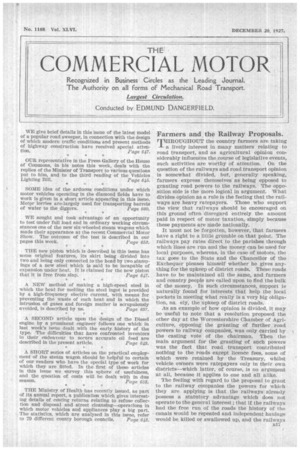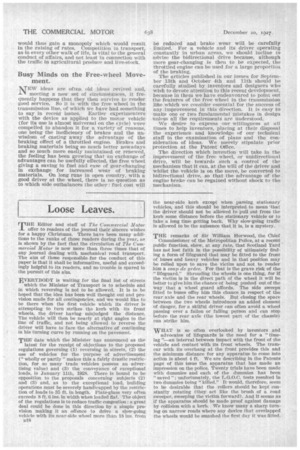Farmers and the Railway Proposals.
Page 35

Page 36

If you've noticed an error in this article please click here to report it so we can fix it.
TROUGHOUT the country farmers are taking a lively interest in many matters relating to road transport, and as agricultural opinion considerably influences the course of legislative events, such activities are worthy of attention. On the question of the railways and road transport opinion is somewhat divided, but, generally speaking, farmers express themselves as being opposed to granting road powers to the railways. The opposition side is the more logical in argument. What divides opinion as a rule is the feeling that the railways are heavy ratepayers. Those who support the view that railways should be encouraged on this ground often 'disregard entirely the amount paid in respect of motor taxation, simply because these payments are made nationally.
It must not be forgotten, however, that farmers have a right to a little grumble on that point. The railways pay rates direct to the parishes through which lines are run and the money can be used for local purposes, whereas, in the case of motors, the tax goes to the State and the Chancellor of the Exchequer pleases himself whether he gives anything for the upkeep of district roads. These roads have to be maintained all the same, and farmers and country people are called upon to find the bulk of the money. In such circumstances, support is naturally found for interests that help the local pockets in meeting what really is a very big obligation, na. ely, the upkeep of district roads.
As an example of how opinion is divided, it may be useful to note that a resolution proposed the other day at the Worcestershire Chamber of Agriculture, opposing the granting of further road powers to railway companies, was only carried by the casting vote of the chairman. Then the main argument for the granting of such powers was the fact that road transport contributed nothing to the roads except licence fees, some of which were retained by the Treasury, whilst vehicle owners were ratepayers only in their own districts—which latter, of course, is no argument at all, because it applies to one and all alike.
The feeling with regard to the proposal to grant to the railway companies the powers for which they are applying is that the railways already possess a statutory advantage which does not operate to the general interest ; that if the railways had the free run of the roads the history of the canals would be repeated and independent haulage would be killed or swallowed up, and the railways would thus gain a monopoly which would result in the raising of rates. Competition in transport, as in every other walk of life, is vital to the general conduct of affairs, and not least in connection with the traffic in agricultural produce anti live-stock.




































































































